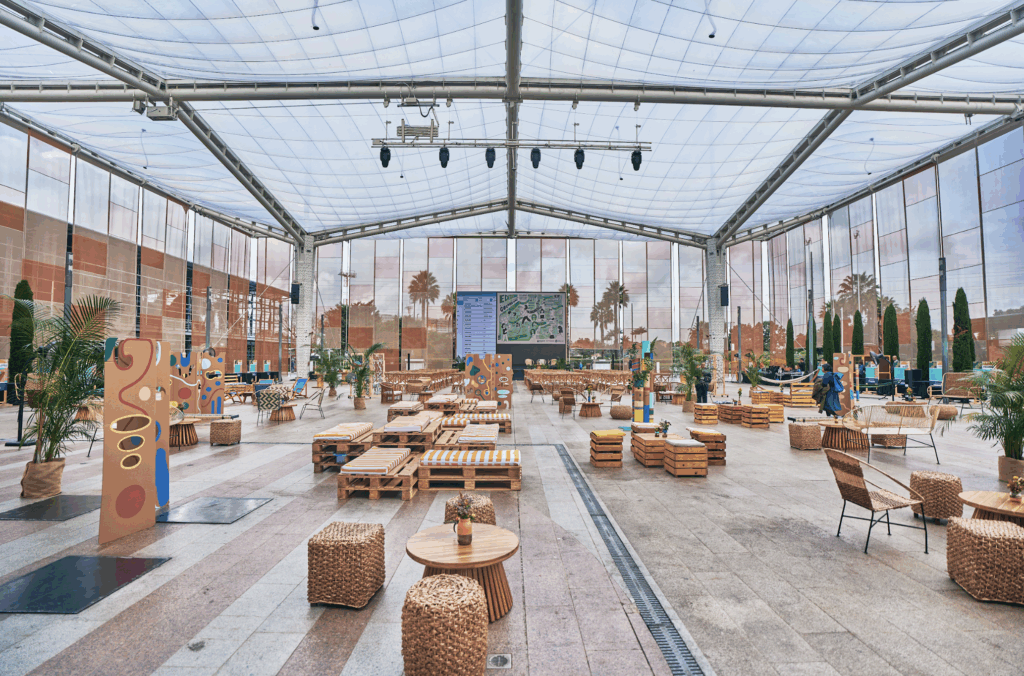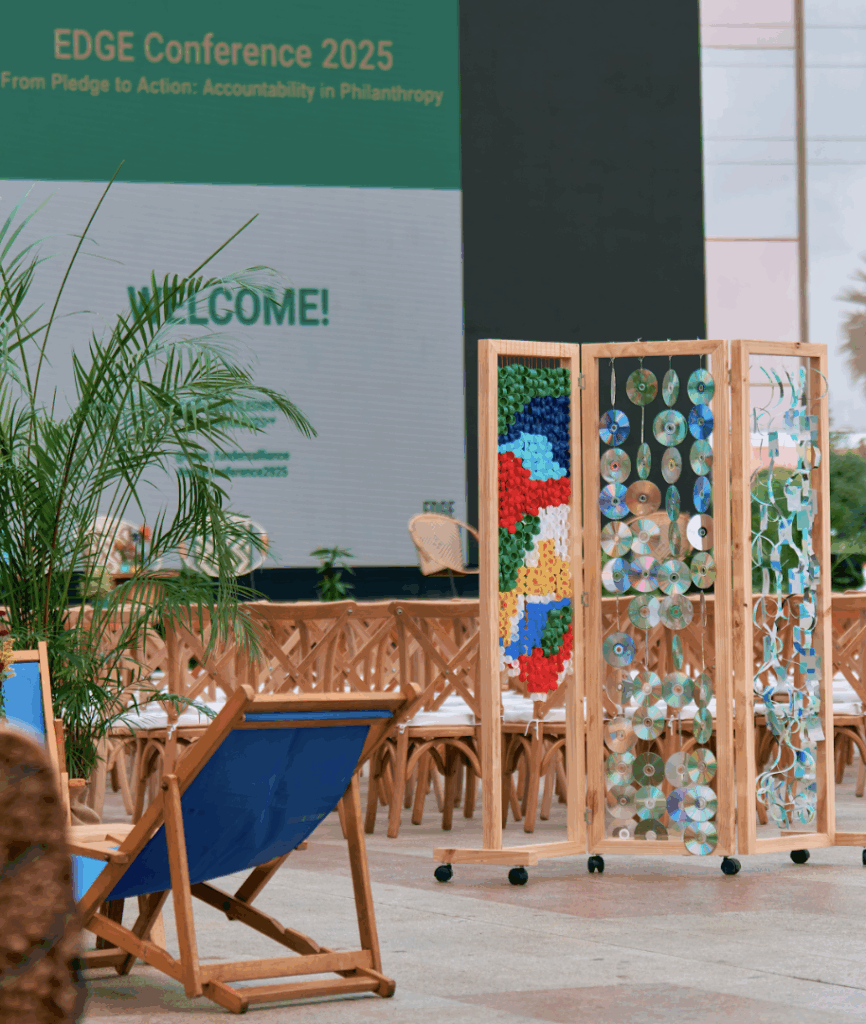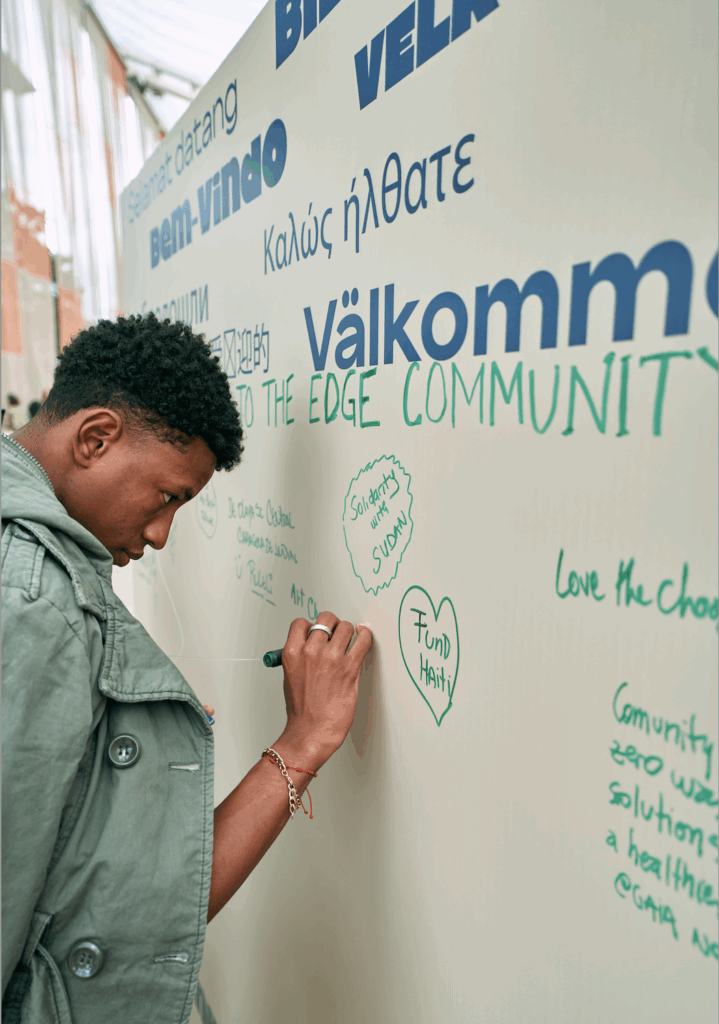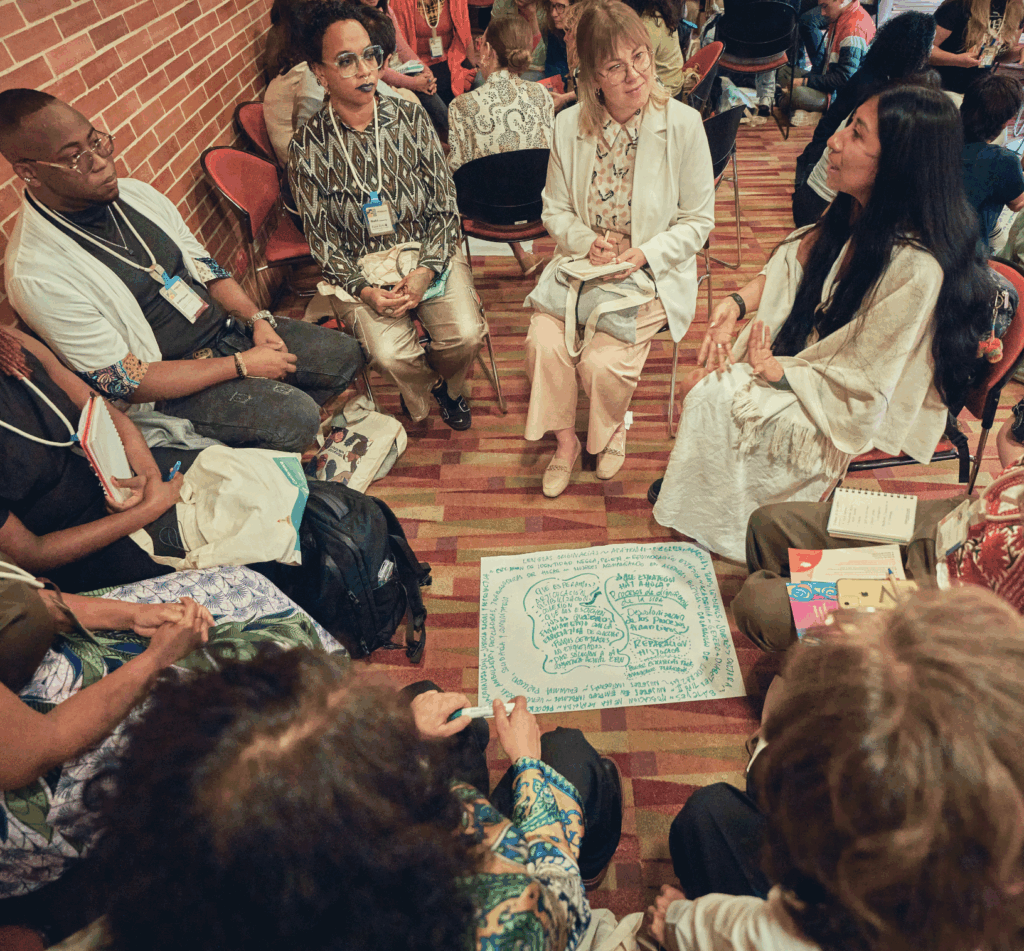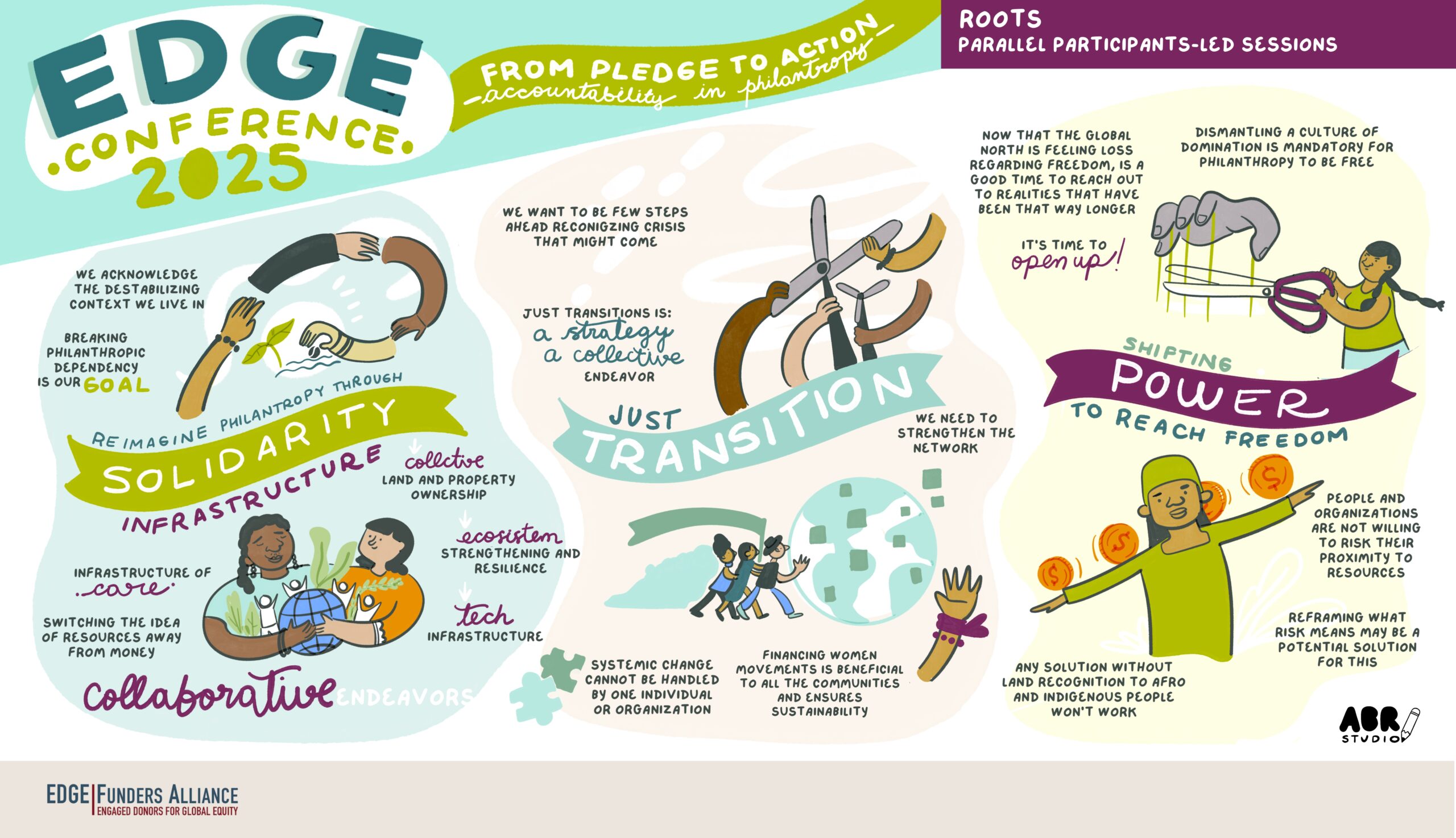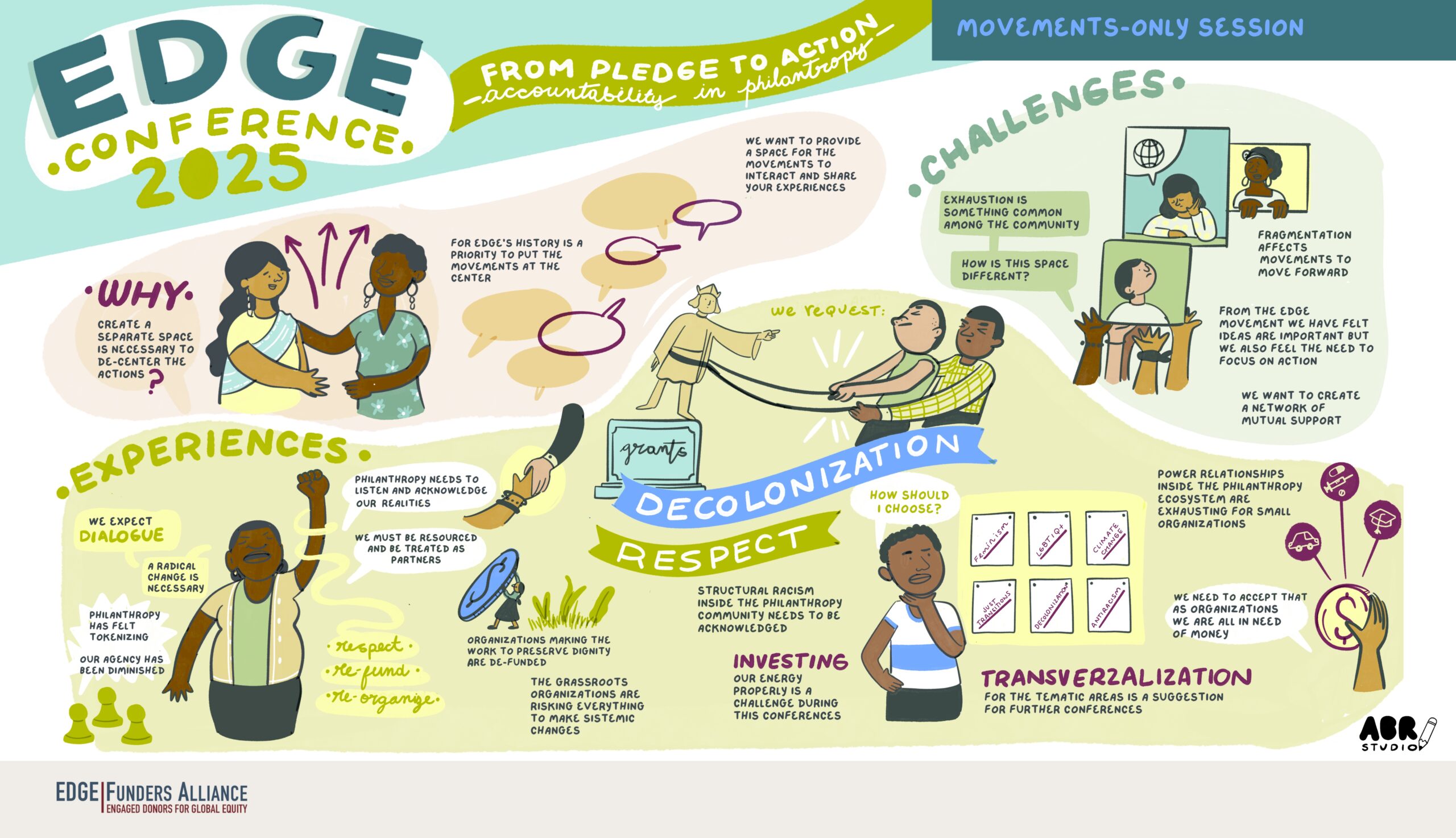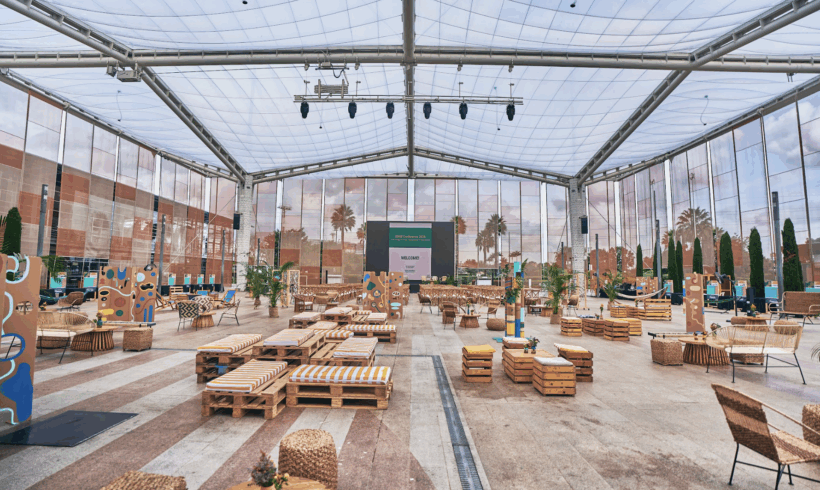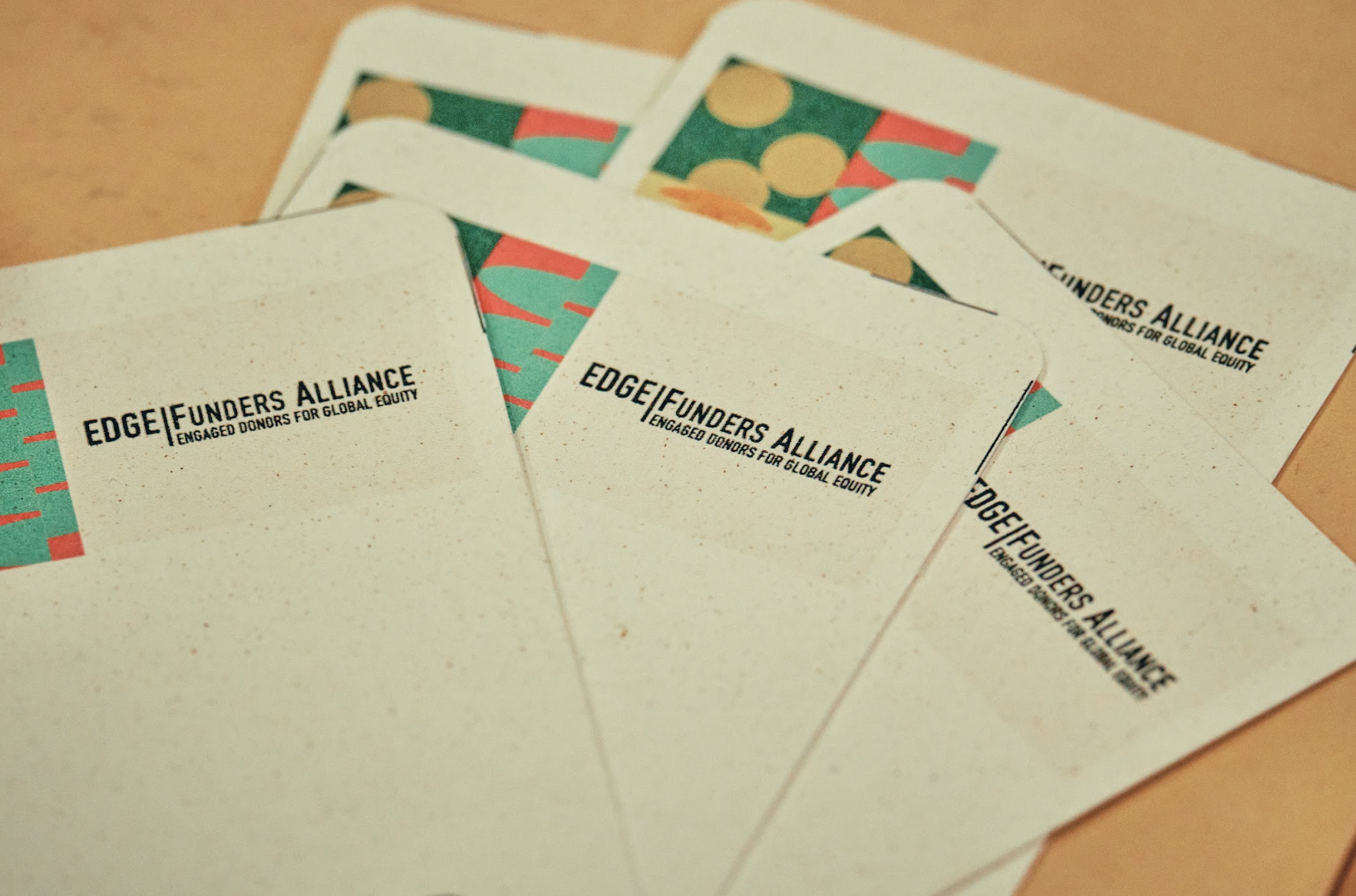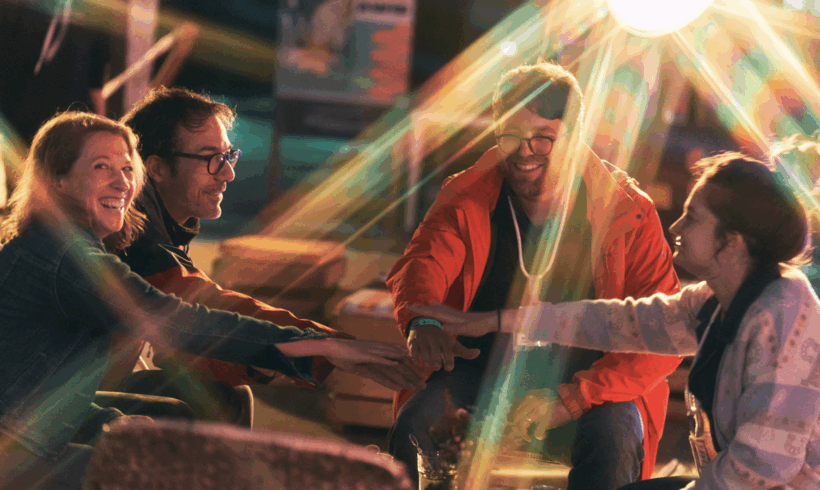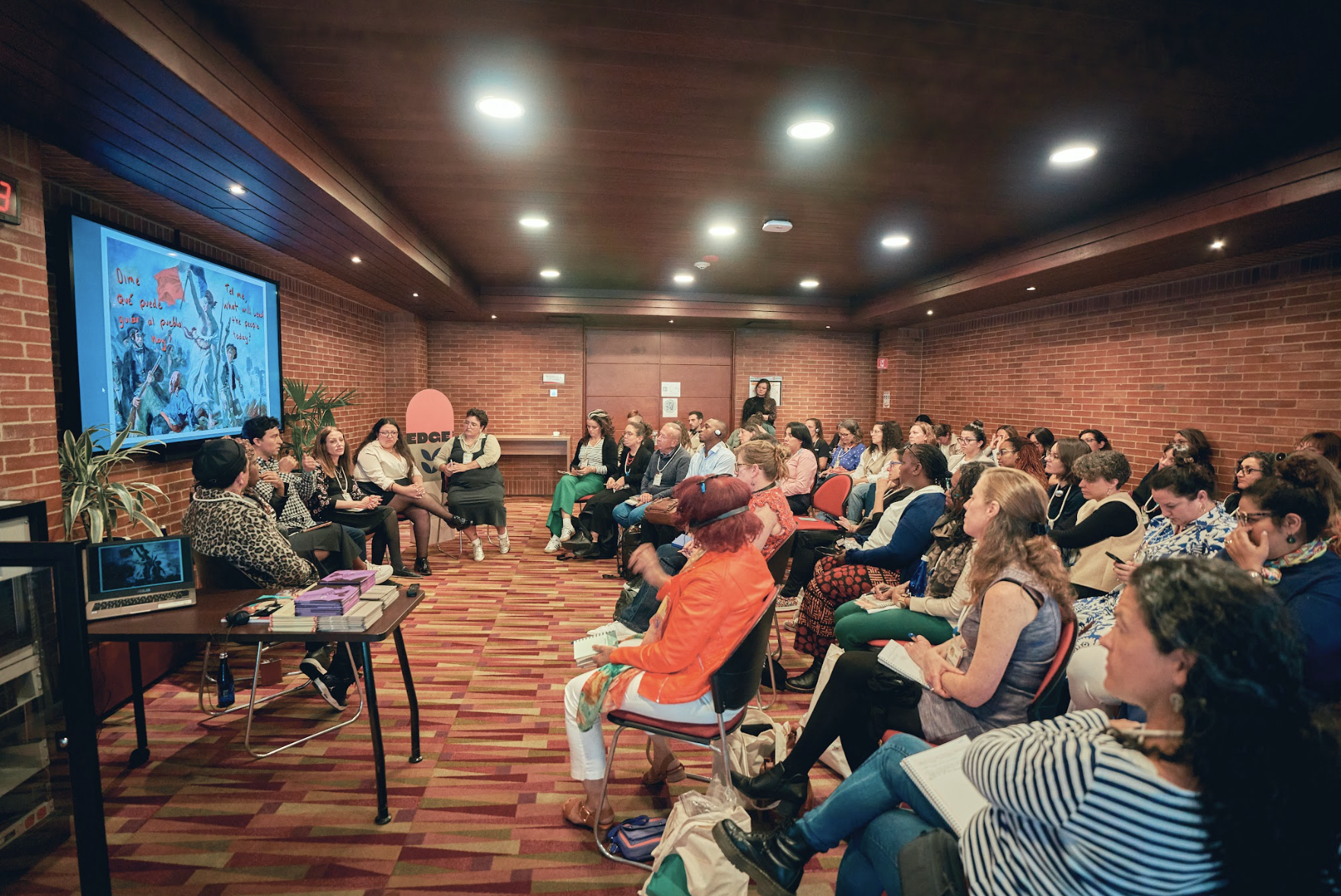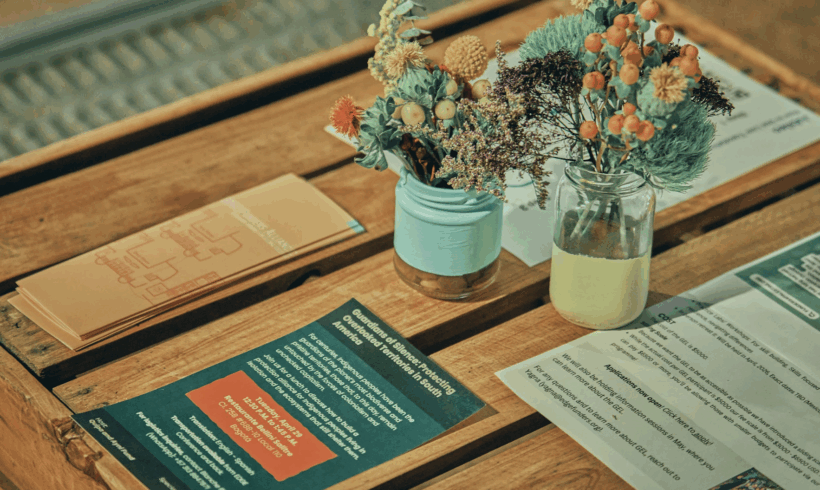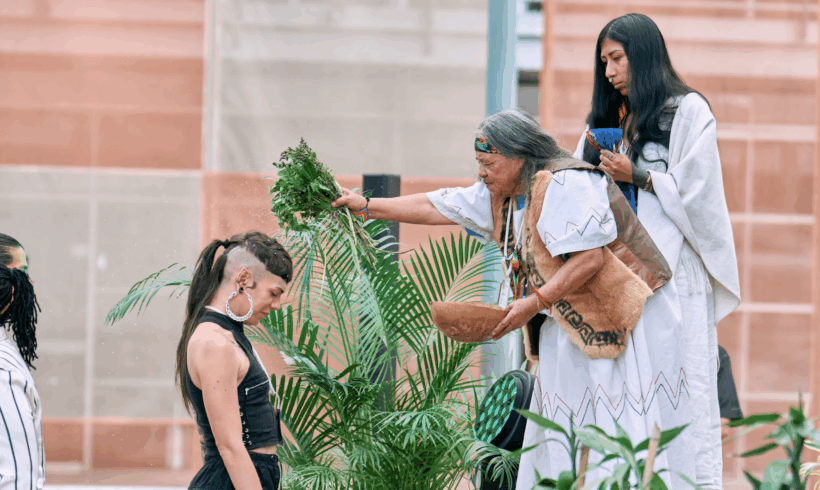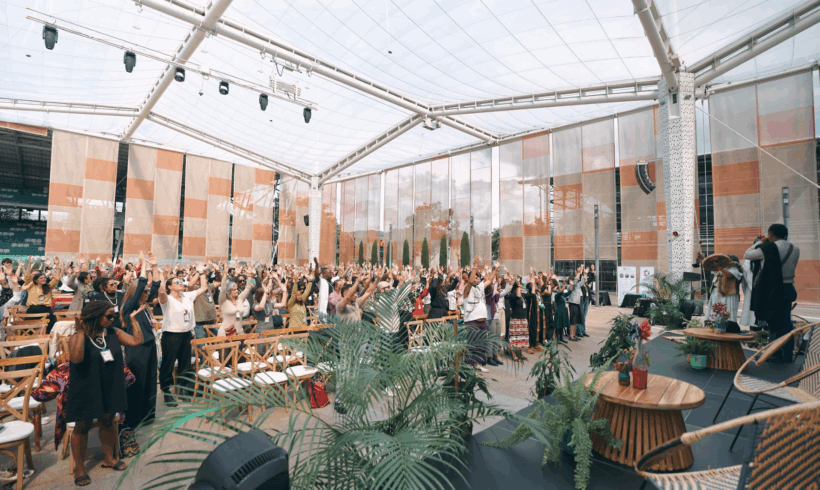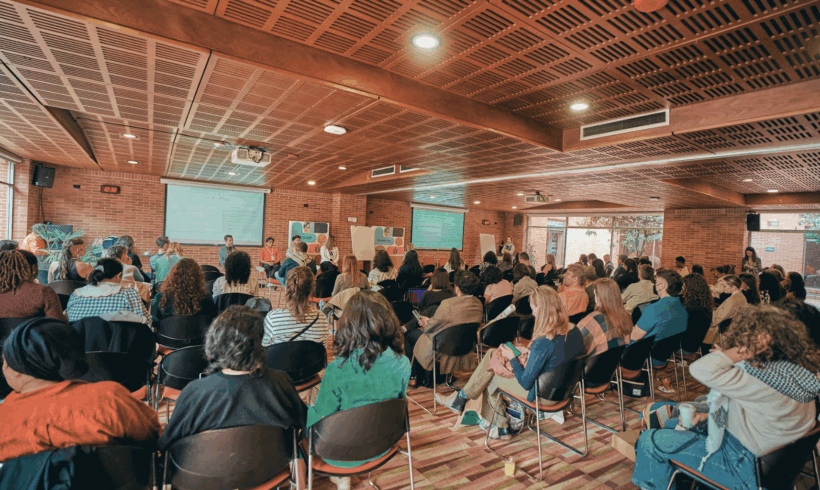The 2025 EDGE Conference
The EDGE community reaffirms that accountability must go beyond pledges and public statements. True accountability requires funders to reflect critically on their role, eliminate trend-driven grantmaking, and advocate within philanthropy for practices that shift power to movements.
Funders must be transparent, responsive to movement feedback, and willing to take risks in support of systemic alternatives. Accountability also means supporting movements when their work is politically bold—rather than retreating from it.
The 2025 EDGE Conference aimed to create space for these difficult yet necessary conversations—centering practical, political, and structural accountability, and advancing concrete strategies for systemic change.
Our community pushed the conversation on accountability beyond pledges and statements. True accountability demands funders not only reflect on their own practices but actively organize within the sector to shift power and resources toward movements and systemic change.
- A recurring message was that accountability means taking risks—not delegating them. For many activists, the risks are not metaphorical; they are life and death. We heard this clearly from those working on the frontlines—from trans organizers in Colombia, to Sudanese communities facing starvation, to Palestinian and Indigenous defenders resisting violence and displacement. The cost of inaction is measured in lives.
- Participants reminded us that money has no meaning without the movements that animate it. And while many funders hold good intentions, intentions alone are not enough. After Berlin, for example, pledges to Palestine were made in good faith—yet much of the promised money was never moved due to institutional roadblocks.
- This conference felt like a final call to action: for funders to internalize the urgency of this moment, recognize the privilege that comes with holding resources, and either move money boldly and in alignment with movement demands—or stop claiming solidarity.
EDGE exists to support this shift. We call on funders to become funder-organizers: to challenge institutional barriers, advocate among peers, and build practices grounded in accountability, transparency, and long-term commitment to systemic change. Thank you to everyone who attended, we hope to remain in touch!
Special thanks to this year’s Conference Planning Committee!
- Alejandra Henriquez | UAF-LAC
- Alejandra Martin | American Jewish World Service (AJWS)
- Alejandro Jaimes Bahamón | Corporación Sihyta
- charles long | Movement for Black Lives (M4BL)
- Golsana Begdum | Dr. Martens Foundation
- Mara Clarke | SAFE and Abortion Without Borders
- Rosalee González | Continental Network of Indigenous Women of the Americas (ECMIA)
- Sebastian Frias | W.K. Kellogg Foundation
- Simón Castaño Cuadro | Posá Suto
- Uma Mishra | FRIDA
- Vanessa Thomas | Black Feminist Fund
Important Links
Stay in touch!
Conference Feedback
Participants List
The Conference In Graphics!
Conference Sessions & Content
Plenary Conversations
The EDGE conference featured a few plenary conversations curated by the EDGE staff and Conference Planning Committee.
- Showing Mirror: Shifting the paradigm of accountability in philanthropy
- Stories of Change: Accountability in Practice
- New Directions in Philanthropy
The opening session of the conference began with a welcome and a ceremony celebrating the land and traditions of the Muysca community. This was followed by a panel discussion focusing on how philanthropy needs to show up in the current context, with emphasis on what it means to be accountable. Speakers: Edgar Villanueva (Decolonizing Wealth Project), Lori Robinson (VidaAfroLatina), Jess Simón Castaño Cuadro (Posá Suto), Jonathas Azevedo (Rede Comuá). Moderator: W’qaas A.Khan (Guerrilla Foundation).
This panel focused on recounting and reflecting on stories of change experienced by funders and movement representatives. The speakers went deeper into what made such changes possible and how such practices can be adopted by others. Speakers shared their personal reflections, and provided some ideas which may be applicable to the current context of philanthropy in particular. Speakers: Rosalee Gonzalez (Continental Network of Indigenous Women of the Americas), Sofia AYOO Ogutu (World March of women Kenya), Jo And – Fig (People Support Foundation), Magda Pocheć (FemFund). Moderator: Alexandra Lamb Guevara (AWID).
By weaving in themes and discussions emerging during previous days of the conference, this panel focussed on ideas and actions for the future.
Speakers: Hilda Vega (Hispanics in Philanthropy), Nino Ugrekhelidze (Dalan Fund). Moderator: Asad Rehman (War or Want).
Daily Movements-only sessions
At the 2025 EDGE Annual Conference, the movement-only sessions created a dedicated space for activists to connect, strategize, and imagine beyond philanthropy at the center. Movement-only spaces are a part of EDGE’s strategy to leverage its access to resources to support global Movement building; work that is usually overlooked and underfunded. Across the three days, the sessions fostered trust, surfaced honest tensions, and laid a foundation for ongoing movement-driven engagement within and beyond EDGE.
On Day 1, participants grounded in the purpose of the gathering—introducing the buddy system, sharing experiences from past conferences, and setting expectations through playful and reflective icebreakers.
Day 2 shifted toward thematic strategy, with breakout groups focused on climate justice, racial justice, gender justice, and economic justice. These groups surfaced pressing challenges, strategic goals, and possibilities for collaboration, culminating in shared offerings to the broader movement circle.
On Day 3, the space leaned into deep reflection and critique of philanthropic models, asking what needs to be abandoned, what alternatives can be built, and how movements can sustain themselves through solidarity and collective care, with understanding that philanthropy needs to step up even if Movements can sustain themselves without them.
Systemic Challenges Named by Movements
- Funders often fail to understand the contexts of the movements they seek to support. They expect narrative shifts or branding changes rather than adapting their own frameworks to meet grassroots realities.
- Example: Demands for “innovation” or simplified metrics ignore the depth of systemic work and care required for transformation.
- Current economic systems—centered around GDP, privatization, and extractive labor—do not value care, Indigenous knowledge, or sustainability.
- Example: Labor is treated as disposable, while care work remains invisible or unpaid.
- Philanthropy often replicates discourses that invisibilize structural causes of harm, reinforcing exclusion rather than addressing it.
- Black communities and movements are often pressured to dilute or reshape their narratives in order to receive support, rather than being resourced to celebrate life and joy in their own terms.
- Disparities exist even within activist spaces—those with more access to funding, language skills, or mobility tend to advance more easily, reinforcing internal hierarchies.
Calls to Action & Strategies from Movements
- Advocate for the deprivatization of essential services and the restoration of Indigenous food, land, and economic systems.
- “Public services must be public.”
- Move away from top-down, donor-led models of “empowerment” to horizontal, reciprocal systems that value time, labor, and community care.
- “Labour is human.”
- Philanthropy must invest time to know who movements are and how they work before launching calls for proposals.
- Relational, not conditional, funding.
- Recognize the political weight of care and push for its redistribution and visibility within and beyond movements.
- Call for “política de los cuidados” (politics of care).
- Challenge the dominance of Global North funding logic, and instead support sovereignty, autonomy, and Indigenous frameworks of exchange.
- “Hope lies in movements pushing for systemic change—economic, political, and social.”
- Invite ongoing reflection on the structures we carry within us, and how they replicate systems we aim to dismantle.
- Healing and accountability are collective tools.
- Build long-term articulation across issue areas and geographies, resisting isolation or competition for resources.
Daily Grantmakers-only sessions
Over two focused days, funders at the EDGE 2025 Annual Conference engaged in a journey of reckoning and responsibility.
The first session centered on power—how it operates in philanthropy, the barriers to accountability, and the ways funders either uphold or disrupt harmful systems. Through power mapping, storytelling, and peer exchange, participants faced hard questions and surfaced the internal tensions that stall change.
The second session shifted into action. Funders explored what real accountability looks like—personally, institutionally, and collectively. Deep-dive workshops and sector organizing sessions led to concrete commitments for shifting power and transforming practice.
This space pushed funders beyond reflection—toward alignment, accountability, and collective action.
Conversations held included:
- Confronting Power & Accountability in Philanthropy
- Beyond Institutions: Organizing as a Sector
- Internal Organizing: Shifting Practices Within Our Institutions
This session provided a critical space for funders to reflect on their power and responsibility in philanthropy. Participants confronted the root causes of inequality in philanthropy, explored the tensions and challenges of accountability, and discussed funder-to-funder accountability as a key mechanism for change. Through power mapping, peer discussions, and facilitated conversations, funders identified where power is concentrated, what accountability requires, and what shifts are needed.
Speakers: Myroslava Tataryn (Disability Rights Fund), Amalia Brindis Delgado (Panta Rhea Foundation) and Erix Cortez (Urgent Action Fund / Latin America). Moderators: W’qaas A. Khan, (Guerrilla Foundation), Sebastian Frias (W.K. Kellogg).
In this session participants came together as committed members of the EDGE community ready to move beyond individual institutional efforts. Facilitated by Bridget Brehen of GGJ Alliance, the session offered a space to explore what it means to organize collectively as funders, build shared power, and act in alignment with movements. Participants reflected on their roles not just as grantmakers, but as organizers within a broader philanthropic ecosystem—facing the urgency of this moment together.
Facilitator: Bridget Brehen (GGJ Alliance)
In this session, led by Cuong Hoang and EDGE staff, supported participants in examining how to push for change from the inside. The session created space for honest conversations about institutional resistance, opportunities for influence, and strategies to embed equity and accountability into internal practices. Funders left with tools and inspiration to challenge inertia within their organizations and shift resources and decision-making closer to movements.
Facilitator: Cuong Hoang
Roots Sessions
The Roots sessions drew on the idea that, just as roots anchor a tree and provide essential nutrients for growth, these sessions focused on the foundational ideas, practices, and radical approaches that nourish systemic change. Roots sessions were designed to center approaches and alternatives that need sustained support and funding to long lasting systemic change.
By going to the roots, we uncovered and amplified the core practices and visions that shift power toward frontline change-makers and align with solidarity movements. Moreover, we created space for funders to share insights into their practices of accountability in the sector, sharing lessons learned and concrete practices of how philanthropy can be aligned with community – led change, and also helping movement leaders better understand the internal dynamics of philanthropy.
- Flip the script – embodying the contradictions of philanthropy
- Redefining Power: Systems, Resources, and Collective Action
- Accountability by Design - Reflections and Questions from the new Global Statelessness Fund
- Rooting Accountability: Survivor-Centered Reforms, Intersectional Frameworks, and Philanthropy′s Role in Systemic Change
- What do we leave behind when the grant ends? Building solidarity and breaking philanthropic dependency
- Supporting Just Transition Strategies Led by Frontline Workers and Communities
- Liberation and the Long Game: Four philanthropic leaders share how they are working to transform systems, shift power, and advance racial justice amidst the current socio-political climate
- Values in Practice: Applying Lessons from Org. Transitions to Shift Mindsets, Change Cultures & Embed
- When funding is not enough: what does holistic support for leaders with lived experience look like?
- Conspiring and constellating: how intermediaries uphold accountability to movements
- Indigenous Peoples’ and Indigenous Women’s Movements: Reclaiming Power and Accountability in Philanthropy
- The Nyéléni Call to Action: Mobilising Globally for Justice and Food Sovereignty
- Alternative community protections for migrants, asylum seekers, and migrants in contexts of conflicts
- Challenging Oppressive Funding: Palestinian Resistance and Grassroots Independence
This interactive role-play session invited participants to switch roles within the philanthropy sector, with funders taking on the position of those seeking funding and vice versa, using assigned roles and poker chips to simulate real-world decision-making. Through this experiential exercise, followed by group reflections and a discussion led by Leap, the session aimed to deepen understanding of philanthropy’s power dynamics and inspired shifts in perspective and behaviour.
Organizers: Aenderwerk & LeapCollective
This session explored accountability in philanthropy by examining how funders can shift power dynamics through redistributive justice and trust in grassroots leadership. Through real-world case studies from Dasra’s Rebuild India Fund and Thousand Currents’ partnerships, participants engaged with movement leaders to learn how funders can challenge traditional hierarchies and support systemic social change.
Organizers: Dasra, Thousand Currents, Anubhuti Trust and ISM & FENSUAGRO
This session explored the “accountability by design” approach of the Global Statelessness Fund, a grant-making initiative co-created by stateless activists, civil society, and donors to shift power and remove barriers to funding. Through discussion and interaction, participants were invited to reflect on the tensions and trade-offs that need to be navigated when centering accountability in funding practices – balancing participatory decision-making and efficiency, flexible funding and accompaniment, all while being responsive to the needs and realities of the movements that we serve.
Organizers: Blue Sky Social Justice Fund, Family Frontiers, Institute on Statelessness and Inclusion & Global Movement Against Statelessness
This session explored innovative approaches to accountability by centering survivor-informed, community-driven models and examining philanthropy’s role in enabling long-term, systemic change. It also proposed bold, systemic alternatives, such as trauma-informed, survivor-centered activist-centered legal frameworks, that challenge existing patriarchal structures in justice systems.
Organizers: SAHR, Women Help Women & Las Comadres.
This session explored how philanthropy can move beyond short-term grants to build sustainable infrastructure for movement resilience in the face of rising political and financial instability. Participants were invited, via both a collective mapping and imagining exercise, to explore knowledge and practice on reparatory funding models, solidarity economies, and collective infrastructure strategies and inspire action to foster long-term movement sustainability and resource justice.
Organizers: Numun Fund, Dalan Fund, Weaving Liberation & Whose Knowledge?
This session explored Just Transition as a grassroots-driven framework led by labor unions, Indigenous Peoples, and environmental justice communities to counter corporate co-optation and drive systemic change. Featuring insights from frontline leaders and funders, it highlighted place-based strategies tackling poverty and pollution while calling on philanthropy to realign its practices to support regenerative economies and frontline self-determination.
Organizers: Just Transition Alliance, Global Greengrants & Grassroot International
This session brought together four philanthropic leaders from local, national, and international contexts to discuss strategies for transforming systems, shifting power, and advancing racial justice in today’s socio-political climate. Participants explored solidarity-building, risk-taking, and long-term approaches to fostering equity and systemic change.
Organizers: ABFE: A Philanthropic Partnership for Black Communities, Lambent Foundation, Philanthropic Initiative for Racial Equity & National Performance Network
This session explored how organizational transitions can serve as opportunities to embed accountability and shift cultures by rooting in values of respect, trust, and solidarity. Through lessons from Voqal Partners and BYP100, participants collaboratively defined core values and developd actionable frameworks to challenge traditional philanthropic models and cultivate transformative, values-driven partnerships.
Organizers: Voqal & BYP100
This session examined how funders can be accountable to both individuals with lived experience and the broader social movements they engage with, using examples from the anti-trafficking and disability rights sectors. Through discussion and shared experiences, participants explored strategies for resourcing lived experience leadership while fostering more inclusive, diverse movements that centered and valued their expertise.
Organizers: Freedom Fund & Disability Rights Fund
This session explored the vital role of intermediary donors in redistributing resources and upholding accountability to movements, ensuring funding reaches communities resisting systems of power. Through discussions on resource activism and non-financial support, it highlighted how intermediaries foster alliances, adaptability, and collective sensemaking while advancing the decolonization of philanthropy.
Organizers: FRIDA, ADD International, Both Ends, HIP & Corporate Accountability
This session examined how Indigenous Peoples’ and Indigenous women’s movements are reclaiming power in philanthropy by establishing self-determined financial governance structures that ensure direct, long-term, and unrestricted funding. Through insights from ECMIA, CONAMI, CHIRAPAQ, and the UN Voluntary Fund for Indigenous Peoples, participants explored how philanthropy can move beyond donor-driven models to uphold true accountability, autonomy, and Indigenous-led decision-making.
Organizers: CONAMI Mexico, CHIRAPAQ & ECMIA
This session highlighted the 3rd Nyéléni Forum as a pivotal global gathering for food sovereignty, uniting social movements and funders to advance systemic change. Through discussions with movement leaders and funders, it explored how philanthropy can align with grassroots solutions, strengthen the Nyéléni Process, and support transformative, community-led efforts for social, economic, and climate justice.
Organizers: GRAIN, La Via Campesina, World March of Women, Growing Culture & Grassroots International
This session explored how organizations and funders can collaborate to create alternative community protections for migrants, asylum seekers, and refugees facing increasing threats and conflicts. Through expert discussions and breakout dialogues, participants examined innovative, community-led approaches in Mexico, Colombia, and the U.S., identifying strategic philanthropic opportunities to strengthen local ecosystems and long-term protections for vulnerable communities.
Organizers: Asylum Access Mexico, Hispanics in Philanthropy, Conrad N Hilton Foundation, Refugiados Unidos & Mutantes
Funding Palestine liberation has become a reference point for movement-centered philanthropy. This session examined how philanthropy has been weaponized to restrict and control Palestinian liberation work and what we can learn from the efforts to resist it. Participants explored how funders can invest in their own irrelevance by supporting grassroots movements in Palestine and other contexts to build long-term self-sustaining infrastructure on their own terms.
Organizers: Rawa, Dalia, Owneh, Funding Freedom & Funder4Palestine
Branches Sessions
The Branches sessions were envisioned as spaces where participants dive into difficult, necessary, and much needed conversations that confront the core issues in philanthropy and work together to understand what kind of collaborations are needed to sustain change. Just as branches stretch outward and support growth, these sessions reached into challenging territories, fostering dialogue that tackles deep-rooted issues, and lays the foundation for systemic change. Branches sessions fostered an environment for both constructive discomfort and collective accountability, helping participants to face the challenging realities that must be addressed in philanthropy for true systemic change to flourish.
- Resourcing Indigenous Movements: Shifting Power and Strengthening Partnerships in Philanthropy
- Cohorts, Convenings and Bridge Building: Lessons and Best Practices in Forging Authentic Collaborations
- On the Right Track: Cross-Regional Feminist Alliances Against the Global Far-Right
- What Do Movements Need in This Moment
- Resourcing Justice Through Repair: A Playful Exploration of Transformative Philanthropy
- Flanking Black Feminist Movements: Strategic Funding for Repair and Crisis Prevention
- Movement accountability beyond participatory grantmaking: Integral accompaniment to amplify resources
- Rethinking Accountability in Philanthropy: Strengthening Values-Aligned Relationships for Systemic Change
- Cross-pollinating knowledge: A decolonial feminist practice in philanthropy
- A Just Energy Transition Starts with Workers: The Responsibility of Philanthropy
- The Future of Funding in the Global North: Resisting Retrenchment and Reimagining Philanthropy
- Feminist Philanthropic Collaboratives in the Face of Backlash: Lessons Learned from the Global South
This session examined how progressive philanthropy can better support Indigenous and frontline movement leaders by addressing power imbalances and funding systemic change. Through firsthand insights from Latin American Indigenous leaders and funders like Corporate Accountability, Amazon Defenders Fund, and Global Forest Coalition participants explored alternative funding models that foster equitable partnerships, flexibility, and long-term movement sustainability.
Organizers: Corporate Accountability & SAGE Fund
This session explored best practices in cohort-based funding and network collaborations that strengthen grassroots power and advance climate justice. Featuring insights from UMI Fund, GAIA, and Global Greengrants, participants learnt how funders and movements can build trust, bridge silos, and co-create solutions that drive systemic change in plastic, zero waste, and climate justice efforts.
Organizers: Global Alliance for Incinerator Alternatives (GAIA), Urban Movement Innovation Fund (UMI) & Global Greengrant Fund
This session explored the On the Right Track (OTRT) initiative, a cross-regional alliance of feminist and women’s funds uniting movements across Latin America and Europe to counter anti-gender and far-right forces. The session examined how OTRT supports civil society and grassroots initiatives, fostering resilience and strategic resistance against the rise of global far-right networks.
Organizers: filia. die frauenstiftung, Women’s Fund Armenia, Reconstruction Women’s Fund, Fondo Lunaria & Fondo Alquimia
This session shared key insights from Thousand Currents’ extensive consultation with 131 social movement partners across 50 countries, highlighting what movements need to thrive in today’s challenging landscape. Through an interactive fireside chat, participants explored themes of interconnected struggles in climate, food, and economic justice, and discussed actionable ways for funders and allies to meaningfully support movement resilience and transformation.
Organizers: ThousandCurrents, FENMUCARINAP & FENSUAGRO
This session explored transformative resourcing systems centered on repair and accountability in philanthropy. Through a gamified strategy, participants engaged with the concept of reparations as an ongoing, relational process, challenging traditional funding models and envisioning resourcing as a tool for systemic justice and collective liberation.
Organizers: Weaving Liberation, Numun Fund & Whose Knowledge
This session applied a Black feminist analysis to philanthropy’s role in crisis response, highlighting how funding often arrives too late or in ways that exacerbate harm. Drawing from the report Black Feminist Movements and Crises, participants engaged in critical conversations about how funders can shift from reactive to proactive strategies, investing meaningfully in Black feminist movements to repair past harms and prevent future crises.
Organizers: Black Feminist Fund
This session challenged the notion that movement accountability ends with participatory grantmaking, advocating for ongoing, integral accompaniment beyond the grant cycle. Participants explored alternative models in philanthropy that extend beyond funding, leveraging non-financial resources such as allyship, connections, and referrals to deepen movement support and amplify impact.
Organizers: FRIDA, The Young Feminist Fund & MamaCash
This session explored accountability as the foundation for values-aligned relationships in philanthropy, inviting participants to reflect on reciprocal accountability and its tensions. Through insights from participatory grantmakers and movement representatives, the session fostered dialogue, build a visual accountability map, and created a collective tool to strengthen accountability practices for systemic change.
Organizers: Global Fund for Children, Dalan Fund, Ruleli Corporación Social y Cultural, Whose Knowledge & Disability Rights Fund
This session explored decolonial feminist approaches to knowledge and MEAL (Monitoring, Evaluation, Accountability, and Learning) in philanthropy, challenging donor-driven, Global North-centric practices that reinforce power imbalances. Through insights from feminist funds in the Global South, participants shared and collectively conjured alternative MEAL frameworks that center marginalized voices, foster reciprocal learning, and reimagine accountability beyond extractive reporting requirements.
Organizers: Urgent Action Fund LAC, Fenomenal Funds & Fondo Semillas
This session examined philanthropy’s role in funding a just energy transition that prioritizes workers, particularly in the Global South, where flexible, long-term support remains scarce. Through insights from FORGE and the Democracy at Work Fund, participants explored how funders can align resources with labor and climate justice, ensuring that frontline workers, especially women and migrants, are at the center of transition strategies.
Organizers: FORGE, Avina, Sembada Bersama, CUT Brazil & Ford
This session examined the shifting landscape of philanthropy amid the rise of far-right influence, focusing on the impact of reduced funding for Global North organisations engaged in resistance and solidarity work. Using the case of Open Society Foundations’ withdrawal from Western Europe, discussions explored the role of Global North movements, the contradictions within philanthropic priorities, the colonial background of international aid and the need to sustain grassroots organising that are building a systemic transition in an interconnected world.
Organizers: ODG & Calala
This session explored how feminist philanthropic collaboratives in the Global South navigate growing backlash, funding gaps, and restrictive policies while ensuring sustainable resourcing for feminist movements. Through shared lessons, dialogue with funders, and actionable recommendations, participants examined strategies for resilience, deepen funder accountability, and strengthen feminist-led collaborations that challenge traditional funding paradigms.
Organizers: Komboa Consortium [African Women’s Development Fund, Initiative Sankofa d’Afrique de l’Ouest, Purposeful, Strategic Initiative for Women in the Horn of Africa & Doria Feminist Fund] & Leading from the South Consortium
Learning Pods
The Learning Pods were a small, informal conversation circle of around 15 people that met at the end of each day. It offered a space for participants to reflect on what they’ve learned or heard throughout the day. Each group decided how to use the time—whether through discussion, storytelling, quiet reflection, or any other form of collective processing. There was no fixed agenda—just an invitation to pause, connect, and learn together.
Some reflections shared back by the Pod leaders include:
- Participants were clear: “Philanthropy is not the center of the work.” Many shared deep frustration at how funding cycles still dictate the tempo of movement life.
- Black and Indigenous leaders in particular named the exhaustion of performing legitimacy for funders, and the disconnect between funding logic and survival in their territories. Some pods asked: Why are we still speaking about “shifting power” as if we’re just getting started?
- Calls to action included:
- Let’s stop framing wealth redistribution as generosity—it’s repair.
- Funders must interrogate the source of their wealth before stepping into spaces asking for “alignment.”
- Fund the strategy, not the format: Organizations don’t need new tools—they need flexible, long-term support for what already works. Let’s stop reinventing and start resourcing what’s rooted.
- The question isn’t just who gets funded—but how we survive when the funding runs out. Participants named the emotional and political toll of operating in scarcity while holding radical vision. There was deep resonance around political accompaniment, not just financial support.
- Key takeaways:
- Not all needs can be solved with money—sometimes solidarity looks like legal support, policy advocacy, or protection.
- Political accompaniment matters: Not everything is solved with a grant. Sometimes solidarity looks like showing up in policy fights, lending infrastructure, or taking public stances.
- Let’s co-invest in solidarity infrastructure that holds us beyond the grant cycle.
- Political work needs rest, strategy, and time—not just deliverables.
- Rather than designing from deficits, participants emphasized starting from what already exists: social fabric, ancestral knowledge, mutual aid, and lived experience.
- Several groups expressed that funders must resource existing brilliance, not create new mechanisms to measure it.
- One takeaway: “Celebrate the capacities we already hold—so we negotiate from abundance, not desperation.”
- Reflections from Cauca, Buenaventura, and other contexts pointed to philanthropy’s complicity in reproducing extractive dynamics, often via intermediaries or programs that fragment rather than fortify.
- Participants called for prior consultation with Indigenous communities, transparency in donor-public sector relations, and funding approaches that do not pit communities against one another.
- A powerful insight: “Movements are judged not just by what they do—but by what they do not receive funding for.”
- There were strong, repeated critiques of how philanthropy engages in Indigenous and Afro-descendant territories without accountability or understanding.
- A key demand: Decolonize not just the grant guidelines—but the relationships.
- As one participant put it: “Stop asking us to translate our realities. Come sit in them.”
- Tensions around intermediary funders were palpable: some saw themselves as aligned with movement goals, while others in the pods challenged that, asking: “If you move money, but still make decisions for us—are you really part of the movement?”
- This sparked rich debates about identity, accountability, and the need for intermediaries to be accountable both upward and downward, particularly when navigating dual roles in philanthropic ecosystems.
- Pods named the danger of radical discourse becoming aesthetic. Participants warned against beautiful politics in theory that are hollow in practice. Several emphasized the need to embody political values in how we relate to each other—even when it’s messy, slow, or full of contradiction.
- Key reflections included:
- “We have to stop playing radical. That means building across differences—even when it’s hard.”
- “The right isn’t afraid to collaborate across lines. What’s holding us back?”
- Liberation starts within: We need tools and space to address internalized oppression inside our organizations—because systems of harm don’t stop at the door of the movement.
What is next?
The EDGE Conference is not the end—it’s a catalyst.
By gathering in a different region every two years, EDGE intentionally disrupts the comfort zones of progressive philanthropy. This isn’t about token inclusion or symbolic travel. It’s about shifting the center of gravity—inviting people whose experiences with power, extraction, and resistance are often sidelined—to shape the conversation. It’s about expanding who gets to be in the room, and on whose terms.
What began in Bogotá doesn’t end here. The conference was a space to listen, build, and challenge—but the real work is ongoing. The EDGE network offers many ways to stay in motion: public offerings open to all, member-only gatherings for deeper strategy, and thematic spaces that bring activists and funders into honest, and sometimes uncomfortable, conversations.
If something resonated with you—an idea, a tension, a possibility—we invite you to stay connected. We hope to continue to build power—across borders, across struggles, and beyond the conference walls.

